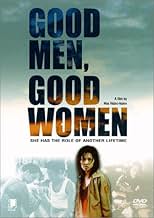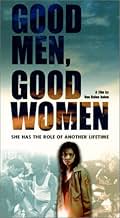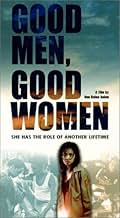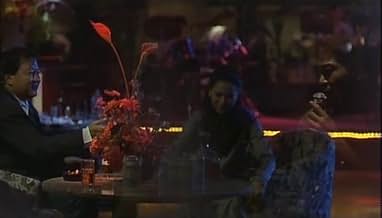Intended as the concluding film in the trilogy on the modern history of Taiwan began with Beiqing Chengshi (1989), this film reveals the story through three levels: a film within a film as w... Read allIntended as the concluding film in the trilogy on the modern history of Taiwan began with Beiqing Chengshi (1989), this film reveals the story through three levels: a film within a film as well as the past and present as linked by a young woman, Liang Ching. She is being persecut... Read allIntended as the concluding film in the trilogy on the modern history of Taiwan began with Beiqing Chengshi (1989), this film reveals the story through three levels: a film within a film as well as the past and present as linked by a young woman, Liang Ching. She is being persecuted by an anonymous man who calls her repeatedly but does not speak. He has stolen her diar... Read all
- Director
- Writers
- Stars
- Awards
- 11 wins & 5 nominations total
- Director
- Writers
- All cast & crew
- Production, box office & more at IMDbPro
Featured reviews
In modern day Taipei, an actress Liang Ching (Annie Shizuka Inoh) is rehearsing for the role of Chiang Bi-Yu, a woman who traveled to China to find the Japanese in the 1940's. Liang is struggling and distraught because of the death of her gangster boyfriend Ah Wei (Jack Kao) a few years prior and because an anonymous man is faxing her pages of her stolen diary which restitute her previous memories of her time with Ah, and after his death. Liang's imaginary episodes of what the film will be like, which are for the most part shot in black and white, her immediate present, and her immediate past are all mixed together with the deftest emotional accuracy.
The shots are so artistically accomplished that they are able to properly the connection of all history and past, with current personal events, and the eternal, constant binds of time. Liang's story nearly directly mirrors Chiang Bi Yu's. Both contemplate in alienation; when Chiang and her compatriots whom she enters China do not speak the language of those who they are trying to help because of the Japanese occupation of Taiwan which, for them, just recently ended. They are labeled as Japanese spies, and nearly killed, and upon the return to Taiwan they are labeled as communists. Because of the oppressive government and recent horrific acts committed by it they want to make a change to make life better. No matter how questionable and near-sighted their political views, they wanted to make some sort of change. Liang and her 'compatriots' are drowning in shallowness. Hou praises the courage of that older generation, but none of that is found in Liang's age. Yet, he appears to say, that these are the same people who go through similar experiences, and are only molded by the world around them, and therefore by history. Over time, the dream for a better future gives way to the dream for more profit because of the implications of history and the political.
In the previous films of the 'trilogy', Hou searched for the relationship between life and a certain form of art. Here, it is of cinema, and therefore Hou questions his own role. Ozu's 'Late Spring' plays on a television near the beginning, and in a self-referential manner, helps represents how cinema is able to understand a people, and their conflicts whether interior or exterior. In the previous films of the 'trilogy', Hou searched for the relationship between life and a certain form of art. Here, it is of cinema, and therefore Hou questions his own role. Ozu's 'Late Spring' plays on a television near the beginning, and in a self-referential manner, helps represents how cinema is able to understand a people, and their conflicts whether interior or exterior.
The regrets of the nation and the regrets of the person are all subtly laid out to dry. In order to move forward into a non-unsure and non-insecure future the regrets must be confronted. It's an eventual and long, process but one that must be done. The political invades the personal, and history's consequences affect the psychological. The implications are devastating - the present condition or 'shallowness' seemed to have been allowed to occur by the acts of the past. This is not a film that is only understandable by Taiwanese standards. It is a universal portrait of the history inherit in the present.
The haunting power of the film is completely understated and will surely always linger on in the viewer's mind. It may not have the rhapsodic epic profoundness of some of Hou's other films, but it contains the grand humanism that they also have. The film is ultimately extremely encapsulating, and with Hou's formal rigour, style, and rhythm, and the expertly grounded performances it is utterly captivating, and exquisite viewing.
This is a movie that bravely confronts issues in a country that is too preoccupied with trying to juggle for positions in the global market. A reminder to everyone that a country's history does not consist of only the valiant highlights, but also of shameful past that should not be discarded.
Good Men, Good Women takes place in three different time sequences: the contemporary world of actress Liang Ching (Annie Shizuka Inoh), her recollection of her recent past as a drug-addicted barmaid, and the world of a yet to be made film about resistance fighters in the 1940s. Hou suggests a contrast between the sterile, corrupt lives of the present generation and the young people of the past who acted with a social conscience. While it is a complex and elliptical film, it is one of Hou's greatest, filled with tenderness and sensuality and an aching melancholy for a world whose promise has remained unfulfilled.
The film opens with a parade of young people dressed as peasants who march toward the camera singing a joyous song: "When yesterday's sadness is about to die. When tomorrow's good cheer is marching towards us. Then people say, don't cry. So why don't we sing." The camera then cuts to present day Taipei where an unidentified caller telephones Liang Chang but refuses to speak. The caller has stolen her diaries, and faxes her the pages daily prompting her to recall her tragic relationship with Ah Wei (Jack Kao), a gangster who died in a shootout. The film intersperses scenes of intimacy between the two lovers with the world of the 1940s where Chiang Bi-Yu and Hao-Tung, have left Taiwan for the Chinese mainland to support the anti-Japanese resistance. The "film within a film" shows how Chiang and Hao are forced to put their children in foster care and Liang identifies with Chiang, drawing parallels from her own experience of having to give up the things she loved the most.
Hou shows that events buried in a nation's past can have far reaching consequences and that history may be indistinguishable from personal memory. Yet the film is not one of ideas but of images and Hou has provided some memorable ones; for example, when Liang sits before a mirror putting on her makeup as Ah Wei sits closely beside her talking about the possibility of her being pregnant. It is a mundane event, yet Hou imparts it with a mysterious and timeless quality. In many ways, Good Men, Good Women is typical of Hou's films with its static camera, long takes, and rhythms of everyday life, yet it is also his most political, a searing indictment of the squandering of a nation's heritage, allowing us to see that a country, like its people, cannot redeem its future until it tells the truth about its past.
Hou's style is subtle, an excellent cinematographer and picture taker, like many of the Asian films (whether this is from a common thread or by accident I don't know). He is not as overtly stylish as Wong Kar-Wai, but the shots he takes and chooses (perhaps the better adjective) are beautiful.
A previous commentator called this style "cinematic masturbation", which I think is an adolescent argument. Just because the points don't hit you over the head doesn't mean they are not being made. This is a political film, dealing with a still sensitive topic. The director definitely cares about the audience. Like anything else, it's the little details that count.
One of those little details is an Ozu film being played on TV in one background shot. Hou has consciously acknowledged Ozu as an influence and his style shows it. The action, so to speak, takes place within the context of the everyday events. The points being made are observed by the routine actions, and unique touches within them.
The most solid point being the commonality of loss, and tragedy between two Taiwanese actresses of different generations. Both lose lovers, and sacrifice children to the events around them.
The other point is the simultaneous affluence and emptiness is modern day life. The actress in the older story is based on a real person, who joined the anti-Japanese resistance in China during WWII. After this, her husband is executed in an anti-communist crackdown in Taiwan. She is both pushed along by events, but shows a determination to live her life and make decisions, This is in contrast to the other story, that of the actress playing (there is a movie within a movie), who is looking back on a life with petty gangsters, drinking and drugs. In material goods she is richer than the older actress ever was, with her upper middle class life, yet poorer in far more many ways. Both are played by the same actress, who handles the two stories well.
In the Hou portfolio, I prefer this to Goodbye South Goodbye, which I felt got a little lost in fancy camera work, but I feel that this is close to Flowers of Shanghai.
Did you know
- ConnectionsFeatures Late Spring (1949)
Details
- Runtime
- 1h 48m(108 min)
- Color
- Sound mix
- Aspect ratio
- 1.78 : 1





















